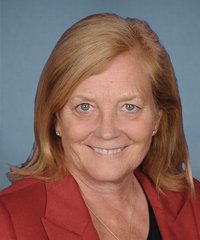
Chellie Pingree never anticipated a life in politics. Living on the offshore island of North Haven, Maine, she raised her kids and ran a small business. She served on the school board and as the local tax assessor, a job no one else in town wanted. But in 1991, when she was approached about running for State Senate, she jumped at the chance.
She scored a remarkable upset, defeating a popular Republican, and went on to serve four terms in the Maine Senate. But throughout her political career, from Augusta to Washington and beyond, the lessons she learned on North Haven have always been her guide: Be accountable to your neighbors, and always use your common sense.
Per- and polyfluoroalkyl substances (PFAS) are dangerous man-made “forever chemicals” that pose serious risks to every Mainer, appearing at our former military installations, farms, and water systems. This is an urgent public health and environmental threat, and it’s growing at an alarming rate—in Maine, there have been more than 30,000 records of PFAS at close to 250 sites across the state, including the former Brunswick Naval Air Station, the former Loring Air Force Base in Aroostook County, and the Kennebunkport, Kennebunk, and Wells Water District.
PFAS chemicals are persistent, bioaccumulative, and toxic. These chemicals have been linked to harmful human health effects, including cancer, reproductive and developmental harms, and weakened immune systems.
My Work to Clean Up Forever Chemicals
On the Congressional PFAS Task Force, I work with my Democratic and Republican colleagues in the House to more urgently address the public health threat of PFAS to better protect communities from the harmful effects of these dangerous chemicals.
As Chair of the House Appropriations Interior, Environment, and Related Agencies Subcommittee, I oversee the Environmental Protection Agency (EPA) and work to secure funding for EPA to develop regulatory standards for drinking water and site cleanups as well as conduct additional research to understand the health effects of PFAS.
As Vice Chair of the House Appropriations Agriculture, Rural Development, and Related Agencies Subcommittee and a member of the House Agriculture Committee, I have worked to secure additional U.S. Department of Agriculture support for dairy farmers whose livelihoods have been jeopardized by PFAS contamination.
In July 2021, I cosponsored the No PFAS in Cosmetics Act, which would require the Department of Health and Human Services to issue and finalize a rule to ban the use of intentionally added perfluoroalkyl or polyfluoroalkyl substances in cosmetics.
In November 2021, I was proud to vote for the Infrastructure Investment and Jobs Act, which invests $55 billion in water infrastructure, including $10 billion in dedicated funding to clean up dangerous PFAS.
In December 2021, Congress passed the National Defense Authorization Act for FY2022 which creates a Department of Defense PFAS Task Force, provides an additional $500 million for clean-up of military communities impacted by PFAS contamination, and requires DoD to publish to the public results of drinking and ground water testing for PFAS conducted on or near military installations, formerly used defense sites, and national guard sites.
In March 2022, Senators Susan Collins and Angus King, Congressman Jared Golden and I urged U.S. Department of Agriculture (USDA) Secretary Tom Vilsack to swiftly and fully utilize all USDA resources and authorities that can assist in responding to PFAS contamination, which is increasingly impacting Maine famers and rural communities.
In June 2022, I introduced the bipartisan Healthy Drinking Water Affordability Act, or The Healthy H2O Act, to provide grants for water testing and treatment technology directly to individuals, non-profits, and local governments in rural communities. Water quality improvement systems installed at the faucet or within a building can provide immediate and ongoing protections from known and emerging water contaminants, like PFAS, lead, and nitrates.